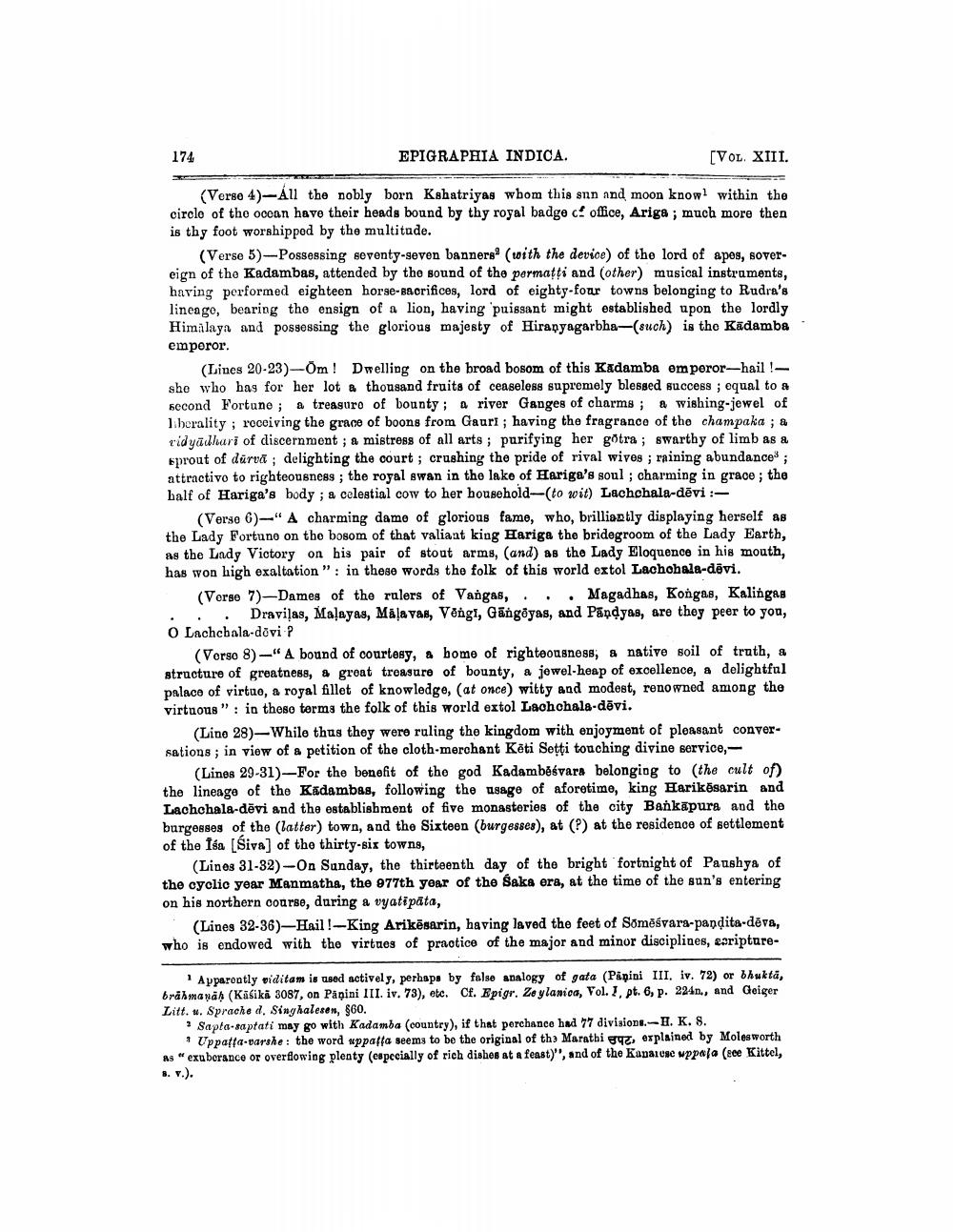________________
174
EPIGRAPHIA INDICA.
[VOL. XIII.
(Verse 4)-All the nobly born Kshatriyas whom this sun and moon know within the circle of the ocean have their heads bound by thy royal badge cf office, Ariga; much more then is thy foot worshipped by the multitude.
(Verse 5)-Possessing seventy-seven banners (with the device) of the lord of apes, sovereign of the Kadambas, attended by the sound of the permaṭṭi and (other) musical instruments, having performed eighteen horse-sacrifices, lord of eighty-four towns belonging to Rudra's lineage, bearing the ensign of a lion, having puissant might established upon the lordly Himalaya and possessing the glorious majesty of Hiranyagarbha-(such) is the Kadamba emperor.
(Lines 20-23)-Om! Dwelling on the broad bosom of this Kadamba emperor-hail!she who has for her lot a thousand fruits of ceaseless supremely blessed success ; equal to a second Fortune; a treasure of bounty; a river Ganges of charms; a wishing-jewel of liberality; receiving the grace of boons from Gauri; having the fragrance of the champaka; a ridyadhari of discernment; a mistress of all arts; purifying her götra; swarthy of limb as a sprout of durva; delighting the court; crushing the pride of rival wives; raining abundance; attractivo to righteousness; the royal swan in the lake of Hariga's soul; charming in grace; the half of Hariga's body; a celestial cow to her household-(to wit) Lachchala-devi :
(Verse 6)-"A charming dame of glorious fame, who, brilliantly displaying herself as the Lady Fortune on the bosom of that valiant king Hariga the bridegroom of the Lady Earth, as the Lady Victory on his pair of stout arms, (and) as the Lady Eloquence in his mouth, has won high exaltation": in these words the folk of this world extol Lachohala-dēvi.
(Verse 7)-Dames of the rulers of Vangas, ... Magadhas, Kongas, Kalingas Dravilas, Malayas, Māļavas, Vengi, Gangoyas, and Pandyas, are they peer to you,
O Lachchala-dovi ?
(Verso 8)-"A bound of courtesy, a home of righteousness; a native soil of truth, a structure of greatness, a great treasure of bounty, a jewel-heap of excellence, a delightful palace of virtue, a royal fillet of knowledge, (at once) witty and modest, renowned among the virtuous" in these terms the folk of this world extol Lachchala-dēvi.
(Line 28)-While thus they were ruling the kingdom with enjoyment of pleasant conversations; in view of a petition of the cloth-merchant Keti Setți touching divine service,
(Lines 29-31)-For the benefit of the god Kadambesvara belonging to (the cult of) the lineage of the Kadambas, following the usage of aforetime, king Harikösarin and Lachchala-devi and the establishment of five monasteries of the city Bankapura and the burgesses of the (latter) town, and the Sixteen (burgesses), at (?) at the residence of settlement of the Isa [Śiva] of the thirty-six towns,
(Lines 31-32)-On Sunday, the thirteenth day of the bright fortnight of Paushya of the cyclic year Manmatha, the 977th year of the Saka era, at the time of the sun's entering on his northern course, during a vyatipāta,
(Lines 32-36)-Hail!-King Arikesarin, having laved the feet of Somesvara-pandita-dēva, who is endowed with the virtues of practice of the major and minor disciplines, scripture
1
Apparently viditam is used actively, perhaps by false analogy of gata (Papini III. iv. 72) or bhukta, brahmanaḥ (Käsika 3087, on Papini III. iv. 73), etc. Cf. Epigr. Zeylanica, Vol. 1, pt. 6, p. 224n., and Geiger Litt. u. Sprache d. Singhalesen, §60.
Sapta-saptati may go with Kadamba (country), if that perchance had 77 divisions.-H. K. S.
Uppatta-varshe: the word uppatta seems to be the original of the Marathi ez, explained by Molesworth as "exuberance or overflowing plenty (especially of rich dishes at a feast)", and of the Kanaiese uppala (see Kittel, B. V.).




